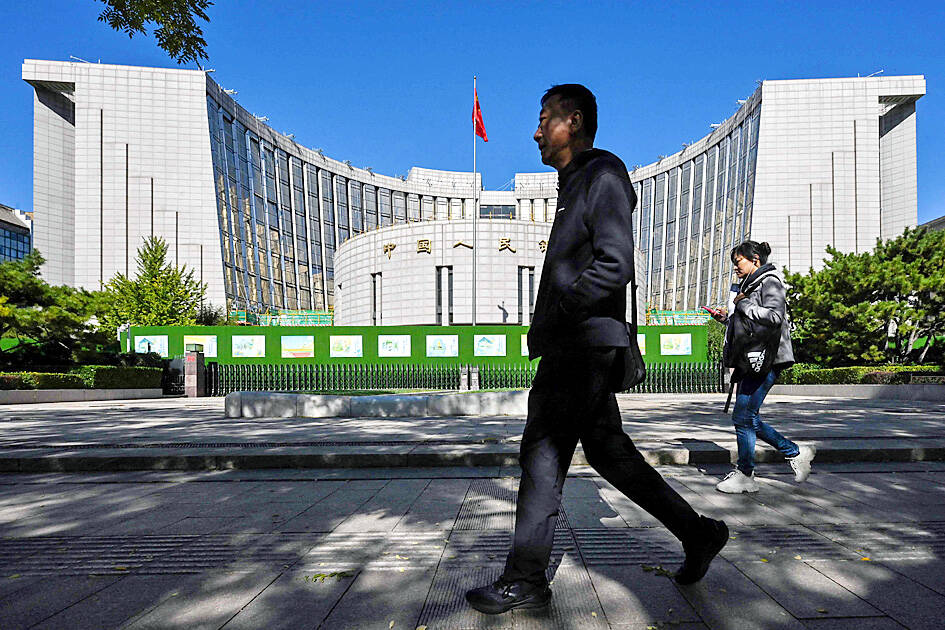China’s central bank yesterday said it had cut two key interest rates to historic lows, in the latest move by Beijing to boost sluggish spending and kickstart the world’s second-largest economy.
The cuts come just days after the country posted its slowest quarterly growth in a year and a half, underlining the deep economic woes the country faces.
Leaders are targeting annual growth of five percent this year, but that goal is being challenged by weak consumption and a prolonged and debilitating debt crisis in the colossal property sector.

Photo: AFP
The one-year loan prime rate (LPR), which constitutes the benchmark for the most advantageous rates lenders can offer to businesses and households, was cut from 3.35 percent to 3.1 percent.
The five-year LPR, the benchmark for mortgage loans, was cut from 3.85 percent to 3.6 percent.
Both rates were last reduced in July and are sitting at all-time lows.
The economy grew 4.6 percent year-on-year in the third quarter, its slowest rate in a year and a half, Chinese government data released on Friday showed.
Authorities acknowledged a “complicated and severe external environment... as well as new problems of domestic economic development.”
The data came after weeks of announcements and news conferences about a stimulus plan, although investors say they are still waiting to see more details.
The country’s top banks on Friday cut interest rates on yuan-denominated deposits for the second time this year in another potential boost to spending.
People’s Bank of China Governor Pan Gongsheng (潘功勝) said that authorities were considering a further cut to the amount commercial lenders must hold in reserve before the end of the year.
Months of sluggish spending have raised fears that China would dip back into deflation after it ended a months-long stretch of falling prices early this year.
Pinpoint Asset Management Ltd (保銀私募基金管理) president and chief economist Zhiwei Zhang (張智威) said yesterday’s rate cut was “an encouraging sign.”
“The monetary policy has clearly shifted to a more supportive stance since the press conference on September 24. The real interest rate in China is too high,” he said.
Meanwhile, the central bank yesterday also conducted its first operations under a swap facility designed to bolster the stock market, exchanging assets worth 50 billion yuan (US$7 billion) with brokerages, fund companies and insurers.
The authorities said 20 institutions participated in the swap operations with a fee rate of 20 basis points.
Under the swap scheme, initially worth 500 billion yuan, brokerages, asset managers and insurers can have easier access to funding by exchanging risk assets such as exchange-traded funds and blue-chip stocks for highly liquid assets such as treasury bonds and central bank bills.
The 20 participants include China International Capital Corp (中國國際金融), Citic Securities Co (中信證券), China Asset Management Co (華夏基金管理) and E Fund Management Co (易方達基金管理).
Additional reporting by Reuters

MULTIFACETED: A task force has analyzed possible scenarios and created responses to assist domestic industries in dealing with US tariffs, the economics minister said The Executive Yuan is tomorrow to announce countermeasures to US President Donald Trump’s planned reciprocal tariffs, although the details of the plan would not be made public until Monday next week, Minister of Economic Affairs J.W. Kuo (郭智輝) said yesterday. The Cabinet established an economic and trade task force in November last year to deal with US trade and tariff related issues, Kuo told reporters outside the legislature in Taipei. The task force has been analyzing and evaluating all kinds of scenarios to identify suitable responses and determine how best to assist domestic industries in managing the effects of Trump’s tariffs, he

TIGHT-LIPPED: UMC said it had no merger plans at the moment, after Nikkei Asia reported that the firm and GlobalFoundries were considering restarting merger talks United Microelectronics Corp (UMC, 聯電), the world’s No. 4 contract chipmaker, yesterday launched a new US$5 billion 12-inch chip factory in Singapore as part of its latest effort to diversify its manufacturing footprint amid growing geopolitical risks. The new factory, adjacent to UMC’s existing Singapore fab in the Pasir Res Wafer Fab Park, is scheduled to enter volume production next year, utilizing mature 22-nanometer and 28-nanometer process technologies, UMC said in a statement. The company plans to invest US$5 billion during the first phase of the new fab, which would have an installed capacity of 30,000 12-inch wafers per month, it said. The

Taiwan’s official purchasing managers’ index (PMI) last month rose 0.2 percentage points to 54.2, in a second consecutive month of expansion, thanks to front-loading demand intended to avoid potential US tariff hikes, the Chung-Hua Institution for Economic Research (CIER, 中華經濟研究院) said yesterday. While short-term demand appeared robust, uncertainties rose due to US President Donald Trump’s unpredictable trade policy, CIER president Lien Hsien-ming (連賢明) told a news conference in Taipei. Taiwan’s economy this year would be characterized by high-level fluctuations and the volatility would be wilder than most expect, Lien said Demand for electronics, particularly semiconductors, continues to benefit from US technology giants’ effort

‘SWASTICAR’: Tesla CEO Elon Musk’s close association with Donald Trump has prompted opponents to brand him a ‘Nazi’ and resulted in a dramatic drop in sales Demonstrators descended on Tesla Inc dealerships across the US, and in Europe and Canada on Saturday to protest company chief Elon Musk, who has amassed extraordinary power as a top adviser to US President Donald Trump. Waving signs with messages such as “Musk is stealing our money” and “Reclaim our country,” the protests largely took place peacefully following fiery episodes of vandalism on Tesla vehicles, dealerships and other facilities in recent weeks that US officials have denounced as terrorism. Hundreds rallied on Saturday outside the Tesla dealership in Manhattan. Some blasted Musk, the world’s richest man, while others demanded the shuttering of his